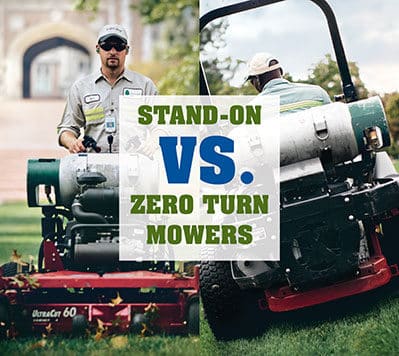Stand-On vs. Zero Turn Mowers | Which is Better & Why?
Commercial lawn care businesses have a lot of ground to cover, so efficiency is key. Lawn care crews can increase their efficiency by using stand-on and zero-turn radius mowers (ZTRs) for the right applications. While both types of units can boost a crew’s efficiency, strategically assigning a unit type to a specific project type can increase your company’s efficiency further.
Stand-on mowers are carving out their place as an efficient solution for smaller, more compact areas common in residential lawns. ZTRs are ideal for efficiently mowing large open areas. Stand-on mowers offer several benefits. First, they are smaller and more compact, so they take up less space on a trailer. Their compact size also allows them to maneuver easily around trees, landscaping and fencing. In a small space, stand-on mowers can do a lot of work in a short amount of time.
Furthermore, standing while working offers additional advantages including greater cognitive awareness to help prevent distractions and potential accidents. It also allows the bumps and vibrations of operating a mower to be absorbed by the operator’s full body, rather than just above their waist. It’s also easier and faster to quickly hop off a stand-on mower to grab fallen tree limbs or garbage that may be in the way.
For large properties and spaces, the proven efficiency of ZTR units are still a popular choice. With advancements in suspension systems, ZTR’s can still be a comfortable ride, even over less than ideal terrain. While in some cases the choice of operating a stand-on or ZTR mower may come down to individual operator preference, there is an advantage to planning crews and routes strategically with your stand-on and ZTR units available based on the composition of the properties you manage and maintain. It can be a good idea to regularly review your crews, their machines and assigned routes ot be sure your company is being the most efficient with your labor and equipment.
Another way to increase productivity and reduce downtime is the incorporation of propane as a fuel source for your fleet. Propane offers several advantages over gasoline, including convenient refueling options, lower total cost of operation and reduced CO2 emissions. Propane mowers are available through many of the industry’s leading brands in several different models, including stand-on, ZTR and walk-behind units, so mower fleets like yours can maximize productivity and efficiency.
Propane mowers offer quick and easy refueling. Propane is stored in an easy-to-handle cylinder, so a full one can be swapped with an empty one on location, in a matter of seconds. That means fewer trips to the gas station, more efficient routes and less time spent refueling. Using propane rather than gas also helps prevent spillage and potential fuel theft, helping your crews operate more efficiently and safe.
Because propane burns so much cleaner than gasoline, propane engines require less maintenance, further reducing their cost of operation. Propane engines also last 25% longer than gas engines, so businesses can get more hours out of the machines they have, further reducing overhead expenses. Plus, propane also typically has a more stable price, which allows for easier budgeting.
Propane burns 35% cleaner than gasoline, giving it a lower carbon footprint than competing fuels. This can offer a competitive advantage when submitting bids to potential customers. Now more than ever, businesses and individuals are showing more concern for the environment, so being able to reduce emissions can be a very compelling advantage for a lawn care business trying to gain new customers.
Stand-on and ZTR mowers, and their strategic use based on the properties you care for, can make a fleet more efficient, and these efficiencies can be compounded even further when paired with propane power. Switching to propane is easy and affordable, and costs can be further reduced through grants and available rebates. Learn more about propane mowers and their benefits by contacting your local propane provider or visit the Propane Lawn Mower page.
